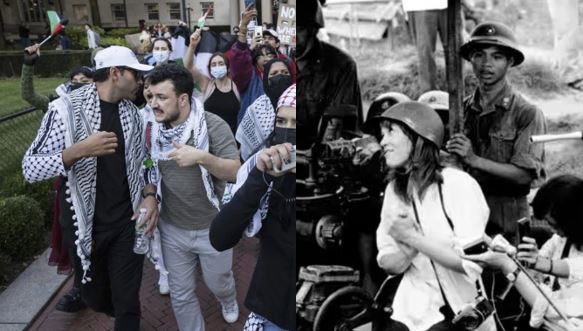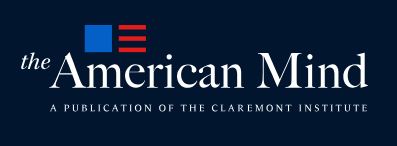A comparison with Jane Fonda helps explain why Mahmoud Khalil and others like him must go.

By Todd Bensman as published May 15 by The American Mind
President Donald Trump’s Administration has mostly defended its efforts to deport visa-holding foreign students on the grounds that the Immigration and Nationality Act (INA) allows deportation of those whose actions might have “adverse foreign policy consequences.”

But the administration could do a better job of articulating squarely what adverse consequences, exactly, it fears from the actions of high-profile detainees like Columbia University’s Mahmoud Khalil, who engaged in and helped organize anti-Israel protests.
Clause 237 (a)(4)(C) of the INA renders deportable any alien “whose presence or activities in the United States the Secretary of State has reasonable ground to believe would have potentially serious adverse foreign policy consequences for the United States” (author’s emphasis) if the Secretary of State “personally determines that the alien’s beliefs, statements, and associations” would compromise United States foreign policy interest.
Secretary of State Marco Rubio, in a two-page April 11 court memorandum for the Khalil case, asserted that Khalil’s “antisemitic protests and disruptive activities” fostered a hostile environment for Jewish students in the United States and therefore undermined “U.S. policy to combat anti-Semitism around the world.”
This is certainly a sufficient argument to give the policy a basic legal threshold. But further support for these deportations could be gleaned by comparison to the Vietnam War, where student protests provably did encourage America’s enemies and hinder America’s aims. The same is true for American diplomatic interests in the war between Hamas and Israel.
Hanoi Jane
Under American military assault during the 1960s and 1970s, North Vietnam’s Ho Chi Minh and his war planners saw the anti-war demonstrations spreading on American college campuses as very good cause, to punch longer and harder than they might otherwise have. Minh took the protests as sound reason to hold out longer against U.S. diplomatic entreaties to work for ceasefires, POW releases, and final peace.
In 1972, Jane Fonda made an infamous visit to Hanois. The Communists let her tour a military installation, where she was filmed sitting on an anti-aircraft gun that no doubt took shots at U.S. pilots. That was but a microdot in a broad antiwar movement picture. North Vietnamese political strategists looked at that picture and concluded they had only to wait long enough for Americans had to cede the battlefield for domestic political reasons.
On several occasions and in letters, President Minh expressed acute awareness of the antiwar movement’s advantages to his cause. He noted his gratitude to the American demonstrators, welcoming their “just struggle.”
Just about everyone from the capital in Hanoi to the warfighters and officers in the field took comfort and courage from the protests.
“[The American antiwar movement] was essential to our strategy, wrote Viet Cong Colonel Bui Tin in a memoir, long after the American military crushed the Viet Cong’s 1968 Tet Offensive. “Support for the war from our rear was completely secure while the American rear was vulnerable. Every day our leadership would listen to world news over the radio at 9 a.m. to follow the growth of the American antiwar movement.”
The north held out all the way until horrific American bombing finally forced Minh into the Paris Peace Accords in 1973, prompting an “honorable” U.S. withdrawal. Then Minh ignored the accords and pushed on until final military victory over South Vietnam in 1975.
The demonstrations of that bygone era had what one could reasonably call an “adverse foreign policy consequence.”
Jane Fonda was, of course, an American citizen, not eligible for deportation. The Vietnam era far predated the Immigration and Naturalization Act as it currently stands.
But for the sake of argument, what if Jane Fonda and many of the antiwar movement’s student leaders were foreigners, maybe even from Hanoi, encouraging Hanoi’s resistance while demonstrating on visas or green cards?
They would all be just as deportable as Mahmoud Khalil and his foreign student cohorts, who are now, while on visas and green cards, encouraging U.S.-designated terrorist group Hamas in its resistance to U.S. foreign policy objectives.
Hamas Mahmoud
The Trump State Department would not have to look far to find evidence that Hamas and its ally, U.S.-designated terrorist group Hezbollah, recognize the usefulness of America’s domestic anti-war campus demonstrations. They say so regularly.
“We in the Hamas movement believe that any popular movement demanding an end to the aggression and genocide against our people are useful and supportive activities for our cause,” Hamas spokesman Bassem Nim told Newsweek on April 26.
Hamas and Hezbollah regard domestic opposition inside the United States as so important that Hamas’ Interior Ministry even issued guidelines to the protestors about how to frame the war politically. MEMRI, a site that translates anti-American media in Islamic countries, recently analyzed a Hamas interior ministry web site instructional video disseminated throughout the protest movement.
Before an Israeli air raid assassinated him in September 2024, Hezbollah leader Hassan Nasrallah went on Arabic-language television to praise the demonstrations along with a brief campaign among Michigan Muslims to withhold support from Joe Biden as a means of pressuring him to temper U.S. support for Israel’s retaliatory war.
“Today, what many people demonstrating in America are doing…of course, we should salute them and be grateful to them,” Nasrallah said in the address. “If the pressure and opposition in America continues, this may also open a door for hope…at the end of the day, it is the American position that is decisive.”
Adverse diplomatic consequences? Eventually, in the midst of domestic pressure from his party’s progressive base, Biden began limiting the kinds of weapons it would sell to Israel and, instead of supporting Israel in its aim of eradicating Hamas, began hard-pressuring Israel to end its campaign. This of course would have left Hamas victorious for having survived intact while Hezbollah remained at strength.
In another speech, Nasrallah attributed the Biden course change almost entirely to the demonstrations that he and the Hamas leaders so often lauded.
“They apply pressure on western governments; Now their leaders are calling for a complete ceasefire,” Nasrallah said of the demonstrators in the United States and other western countries. “The passing of time increases the pressure on the enemy and its protectors. Today, even the heads of state in Western countries who spoke in the early days against a ceasefire and used to say that a ceasefire would serve the interest of Hamas…today, all of them have joined the voices calling for a complete ceasefire.”
If the spreading anti-Israel campus demonstrations forced Biden to shift from his preferred diplomatic strategy, the Trump Administration might well claim Hamas felt emboldened to hold out longer on a U.S.-brokered hostage and prisoner swap deal just before Trump entered office in January, then to conduct provocative and humiliating hostage-release shenanigans that soon restarted the war.
Trump and his envoys are even now working on another ceasefire hostage release deal, but with far less “interference” on college campuses thanks to his deportations. Alongside its current argument about antisemitism, the Trump Administration would do well to make clear that Hamas’s and Hezbollah’s own statements give plenty of evidence to justify deporting foreign students like Khalil under the INA.